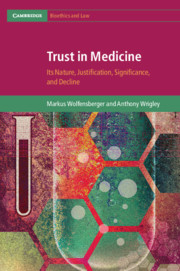Book contents
- Trust in Medicine
- Cambridge Bioethics and Law
- Trust in Medicine
- Copyright page
- Dedication
- Contents
- Figures
- Tables
- Preface
- Acknowledgements
- A Note on Usage
- Part I Introduction
- Part II The Nature of Trust
- 3 A Critical Analysis of Existing Definitions of Trust in Medicine
- 4 Proposing a New Type of Definition
- 5 A Pattern-Based Definition of Trust
- 6 Differentiating Trust from Related Concepts
- 7 Adapting the Definition of Trust to Different Situations
- Part III Justification of Trust
- Part IV Significance of Trust
- Part V The Decline of Trust
- Part VI Perspectives
- References
- Index
- Series page
6 - Differentiating Trust from Related Concepts
from Part II - The Nature of Trust
Published online by Cambridge University Press: 19 August 2019
- Trust in Medicine
- Cambridge Bioethics and Law
- Trust in Medicine
- Copyright page
- Dedication
- Contents
- Figures
- Tables
- Preface
- Acknowledgements
- A Note on Usage
- Part I Introduction
- Part II The Nature of Trust
- 3 A Critical Analysis of Existing Definitions of Trust in Medicine
- 4 Proposing a New Type of Definition
- 5 A Pattern-Based Definition of Trust
- 6 Differentiating Trust from Related Concepts
- 7 Adapting the Definition of Trust to Different Situations
- Part III Justification of Trust
- Part IV Significance of Trust
- Part V The Decline of Trust
- Part VI Perspectives
- References
- Index
- Series page
Summary
In most of the literature, trust is treated as a binary concept: either you trust or you do not trust. Here, the authors argue that this is wrong. Whereas the opposite of knowledge is ignorance, i.e. the absence of knowledge, the opposite of trust (a positive expectation) is not simply the absence of this positive expectation but a negative expectation (distrust). In between trust and distrust there is yet a third option: the suspension of trust (mistrust). To disregard this distinction has serious consequences: opinion polls ask people whether they trust doctors or not. If people answer ‘no’, it remains unclear whether they have suspended their trust or whether they harbour negative expectations. Belief-in, hope, reliance, and confidence are often used interchangeably with trust. This intermingling leads to misunderstanding, as several examples illustrate. Hence, it is mandatory that we distinguish these terms. As the authors demonstrate, this can be achieved by using pattern-based definitions of these related concepts. The chapter ends with a closer look at the role that these four often-conflated concepts play in the patient–physician relationship in separate subsections.
- Type
- Chapter
- Information
- Trust in MedicineIts Nature, Justification, Significance, and Decline, pp. 72 - 88Publisher: Cambridge University PressPrint publication year: 2019



